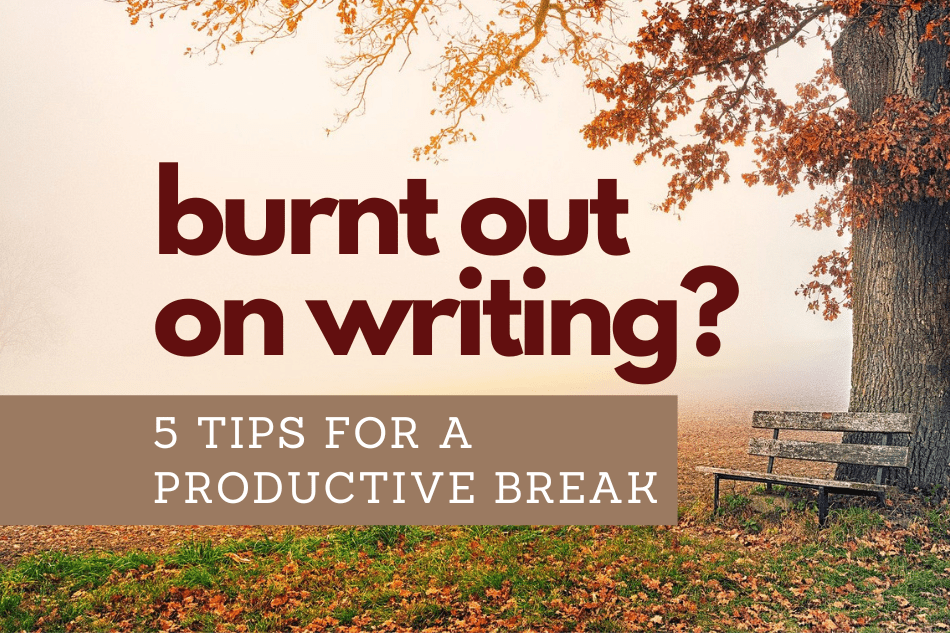By Erin Flanagan
One of the most familiar pieces of writing advice is to write every day, and for years I’ve wondered whether that’s one of those “do as I say and not as I do” bon mots that just leaves a lot of writers feeling they’ve failed.
There are definite advantages to writing every day or many times a week—the biggest being that you’re staying engaged and living in the story, and the creative veins are open and ready to receive—but I fear this advice too often ends up being more guilt-inducing than helpful. Actually, a break from writing can be a wonderful thing: a chance to refill the well, read widely, and give back to the literary community.
Here are five tips to help you think about your own breaks as opportunities to recharge and refocus what you’d like from your career:
-
Think about why you want to take a break.
Whether you’re talking about a week off, a month, or more, there are tons of valid reasons to take a break from writing—you’re expanding your family, you’re overwhelmed at your day job, you just can’t face the page—and it’s important to know your reason(s) so you know how to structure that time.
After I had four novels rejected and had written a first draft of my fifth, I looked at the pile of pages in front of me and felt nothing but despair. Any joy I’d found in writing was gone and each day in front of the keyboard felt like a punishment.
I finally had to ask myself: Why are you trying to do something that makes you so miserable?
The question prompted me to figure out what I really wanted from writing. I remembered the early days—how wonderful it felt to lose myself in a story and not worry about whether anyone would ever publish it. I wanted to get back to that, and taking a break seemed the best possible way to get there.
What it is you hope to accomplish by stepping away from writing? Give yourself permission to go for it.
-
Set an end date for your break
Expiration dates can help you reframe your thinking too. Set one that’s far enough away that it’s not looming over you, but also isn’t an open-ended hiatus.
Facing the burnout I mentioned above, I ended up deciding to take a break for (brace yourselves) a year. I really needed that much time to recharge and figure out if I wanted to go back to writing short stories, revise the novel, start a new novel, or give up writing entirely. Frankly, I was scared—I feared I’d never return—but as burnt out as I was, it was the only option.
How much time do you need to feel you’re ready to return? Do you just need a week or two to get your kids through the busy end of their school year? Do you want to wait until mid-summer to try writing a new story or chapter?
Think in concrete, realistic terms. (Remember, there is never a perfect time to write. Deciding you need your newborn to be in college is not productive. This is about being kind to yourself and giving your creative drive some space.)
-
Give back to the literary community.
If you’re simply overwhelmed by other commitments, this step may not be for you. But if you’re grappling with more of an existential problem, think about how you can give back to the literary community while you find your footing again. Could you write book reviews, even if just on Goodreads, and help boost other writers? Interview authors for a podcast or blog? Maybe you could give talks at local libraries, or sign up for a writing workshop (a win-win), or attend some other authors’ readings. These activities will help others as well as yourself.
-
Have a side piece.
I was at a writing retreat with friends recently and half of us were working on what we dubbed “a side piece”—the writing project that wasn’t our “real” writing in that we were genre hopping or penning an article or essay instead of a whole book.
Each of us recognized how much fun it can be to dabble in something different and stretch ourselves, to get back to the excitement of writing before it was weighted with expectations.
Is there something you’d like to experiment with? Maybe you’d like to write some poems, or a children’s book, or write song lyrics? Or maybe do something else creative, like paint or draw? There may be a good reason you’re feeling that calling, so go for it!
-
Let the guilt go.
We all need time to refresh and refill, and feeling bad about taking a break isn’t doing you any good. After my daughter was born, I didn’t write for six months, and it was less a conscious decision than an effect of general exhaustion that made creative work impossible. So in addition to feeling like an incompetent new mom, I also felt guilty about not writing, when what I should have been doing was celebrating keeping this tiny, new human alive every day. Taking a conscious break would have made all the difference.
As I mentioned, I was nervous about the planned break too, worried that once I stepped away, I’d never want to return, but the opposite happened: I missed it, and couldn’t wait to start playing in fiction again. Having renewed my joy for writing and made a ton of new writing friends, I’m still excited (nearly) every day to write again. And that novel I was struggling with, Deer Season, the fifth one I wrote? It just won the Edgar Award for Best First Novel by an American Author. My next novel, Blackout, will be out in July.
Erin Flanagan ‘s next novel, Blackout, is forthcoming July 1, 2022 with Thomas & Mercer. She is the author of Deer Season, winner of the 2022 Edgar for Best First Novel by an American Author, as well as two short story collections. Erin is an English professor at Wright State University in Dayton, Ohio and a regular book reviewer for Publishers Weekly. Say hello on Twitter or Instagram @erinlflanagan.
‘s next novel, Blackout, is forthcoming July 1, 2022 with Thomas & Mercer. She is the author of Deer Season, winner of the 2022 Edgar for Best First Novel by an American Author, as well as two short story collections. Erin is an English professor at Wright State University in Dayton, Ohio and a regular book reviewer for Publishers Weekly. Say hello on Twitter or Instagram @erinlflanagan.





